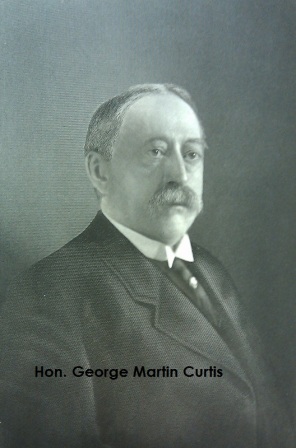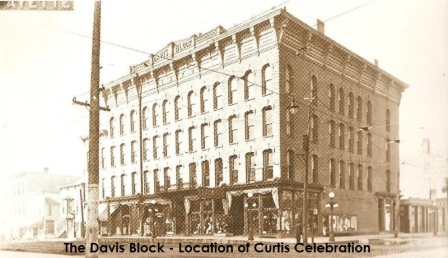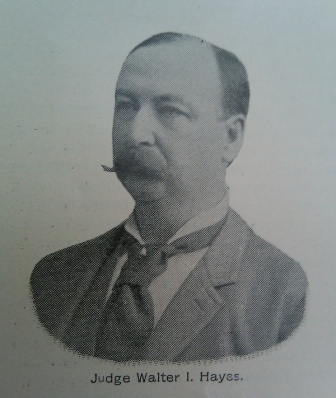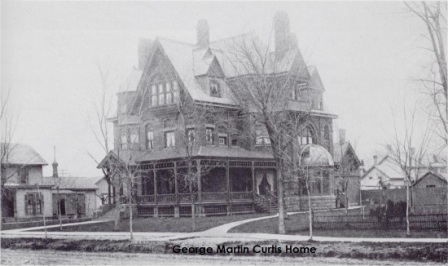Celebration of the Election of George M. Curtis
From: The Clinton Daily Herald; Friday Evening, November 9, 1894, P. 3
Transcribed by a Clinton County IaGenWeb volunteer.
WAS A LOVE FEAST.
MUSIC, RED FIRE AND ELOQUENCE.
The Greatest and Grandest Jubilee in Clinton’s History – Monster Parade –
Booming Cannon – Fire Works – Sunbursts of Eloquence at the Davis – Republicans
and Democrats Alike Pay Tribute to Congressman-Elect George M. Curtis.
 Oh what a night.
Oh what a night.
It was grand! glorious! magnificent! superb! entrancing! stimulating! inspiring!
The like of it was never seen in Clinton before. At 7:30 o’clock last night
Fifth avenue and Second street reminded one of State and Madison streets on
Chicago day.
And it was all in honor of a grand and noble man – George Martin Curtis, our
townsman, Congressman-elect from the Second District of Iowa. Republicans and
Democrats alike turned out to pay him tribute, to rejoice over the glorious
triumph of truth and right.
The monster parade was in three divisions which moved simultaneously from the
Second, First and Fifth Wards and met at Seventh avenue and Fourth streets. The
parade then marched to Sixth street, and headed by Masters Eugene Curtis and
George Sweney, on their ponies, marched down Fifth avenue amid a blaze of red
fire, rockets and Roman candles. The Citizens Band headed the first division,
the Camanche Avenue Cornet Band the second and the Clinton Union Band the third,
and a drum corps brought up in the rear with two farm wagons, with a supply of
bells, horns, rockets and candies. The music of the bands was almost drowned by
the din of horns and bells and the cheers of thousands of people who crowded the
sidewalks on each side of the line of march; and above it all a cannon on the
river front chimed in with its boom! boom! boom! And the bells of fifty
locomotives in the Northwestern yards kept up their clang! clang! clang!
The railroad boys were out in full force, over 300 of them being in line. One of
the transparencies in the railroad division represented an old fashioned car
coupler (which is still largely in use) showing the link, pins and buffers and
just above a hand with two fingers gone. “Hayes’ Car Coupler” was the
inscription on the transparency and another one showed a maimed hand dropping a
“Curtis” vote into the ballot box. There were also numerous others equally as
good.
All along the line of march the residences and shops were brilliantly
illuminated, and it was noticeable that some of the most brilliantly illuminated
and gaily decorated places were those of staunch Democrats. All alike rejoiced
in the triumph of a good, pure and honest man.
 The exercises at the opera house began about o’clock, when F. R. Peck, chairman
of the Republican city central committee called the meeting to order and
announced Dr. George A. Smith as chairman of the evening. Dr. Smith attempted to
speak but it was several minutes before he could be heard. The vast audience
before him cheered, yelled and tooted tin horns until the building threatened to
fall. Finally the speaker made himself heard, and introduced Hon. George M.
Curtis.
The exercises at the opera house began about o’clock, when F. R. Peck, chairman
of the Republican city central committee called the meeting to order and
announced Dr. George A. Smith as chairman of the evening. Dr. Smith attempted to
speak but it was several minutes before he could be heard. The vast audience
before him cheered, yelled and tooted tin horns until the building threatened to
fall. Finally the speaker made himself heard, and introduced Hon. George M.
Curtis.
When Mr. Curtis came forward the audience stood upon its feet and fairly yelled.
It was an ovation that would have made a king’s heart swell with pride. When
order was restored Mr. Curtis said, in substance: “We have met here to-night to
celebrate a great victory for the first time in many years a Republican
Congressional victory – a victory unparalleled in the Second District of Iowa,
if not in the United States. It is a remarkable victory from the fact that our
Democratic friends resorted to methods of which you did not approve; methods
upon which you have stamped the seal of condemnation. It is unnecessary for me
to make a speech. Even if it were I have not strength enough to do so. There are
gentlemen present to whom we are largely indebted for the victory. If I could I
would take each and every one in this audience by the hand and thank him
personally for his active, earnest and efficient support. I may be excused for
saying it but I feel that the result is also a personal vindication. I want to
assure the people of this District that in any possible legislation in which I
may take part my interests are strictly identical with yours. I want to say to
you in closing that this is one of the proudest moments of my life.”
 After the applause which followed Mr. Curtis’ address had subsided the glee club
favored the audience with a campaign song, which brought down the house. The
Herald regrets that it cannot spare the space to publish it and all the other
songs sung by the glee club last night. They were tuneful, bright and witty, the
verses of all the selections being composed by Mr. A. P. Barker.
After the applause which followed Mr. Curtis’ address had subsided the glee club
favored the audience with a campaign song, which brought down the house. The
Herald regrets that it cannot spare the space to publish it and all the other
songs sung by the glee club last night. They were tuneful, bright and witty, the
verses of all the selections being composed by Mr. A. P. Barker.
Mr. John Coleman was then introduced and in a neat speech presented Mr. Curtis
with a gold headed cane, the token offered by St. Peters’ Catholic church fair,
held at Sabula, to the most popular candidate for Congress. It will be
remembered that before the election Mr. Curtis received the almost unanimous
vote of those who attended the fair. Mr. Curtis responded in a few well chosen
remarks and then the chairman introduced Hon. S. L. Baker, of Bellevue.
Mr. Baker was greeted by tremendous applause and when he could be heard he said
that the victory just won was a triumph of virtue, morality and principle. He
said that Jackson county was the most conservative county in Iowa if not in the
United States and that the Republican victory just won there was the greatest
perhaps in its history. He told of how the fight had been won in Jackson county,
and closed with a beautiful tribute to Hon. George M. Curtis.
The glee club then sang a campaign song to the tune of “John Brown’s Body etc,”
the audience joining heartily in the chorus, which was heard for blocks away.
Mr. Frank Smith (“Vinegar” Smith) of Davenport was next introduced. What’s the
matter with Smith?” yelled a voice, and 2,000 voices replied “He’s allright!
Three cheers for Smith,” and the cheers were given with a hearty good will.
“Scott county sends greetings with 2,403 Republican gain,” said Mr. Smith. And
then he had to wait for a few moments until the applause subsided. His speech
was brief, but it was funny.
Mr. George Metzger, also of Davenport followed Mr. Smith and he was accorded an
equally enthusiastic reception. He told of how the fight was made and won in
Scott county.
After another selection by the Glee Club Major Lacey, of Louisiana, was
introduced. It was some moments before he could make himself heard, so great was
the applause. Major Lacey had just arrived in town from the South. He told the
audience that Louisiana would have sent three Congressmen to Washington if the
Republicans who voted in that State could have had their ballots counted. He
told of election frauds in that State that made honest hearts turn sick. Major
Lacey was wonderfully in earnest and his words carried conviction to the hearts
of his hearers.
The glee club sang another topical song and at its close there were loud cries
for Grohe. The defeated candidate came forward just as bright and smiling as if
he hadn’t just been skinned out of his election. He received an ovation equal to
any other of the speakers, and he told his audience how Hayes had gone down the
river, the day after election, on the whale boat Mr. Grohe delivered one of his
characteristic speeches, brief and full of wit, and as he took his seat shouts
went up for “Sutton!” ‘Sutton!”
Mr. Sutton appeared and for fully three minutes the audience cheered and yelled.
When quiet was restored Mr. Sutton exclaimed: “A reception such as you have
given me is worth a thousand defeats!” He then sailed in and delivered a brief
but rousing address, and retired amid vociferous applause.
Mayor E. A. Hughes was next called for and was warmly applauded. His remarks
were brief and right to the point, and he paid a high tribute to the Republican
workers in Scott and Jackson counties.
“Jumbo Gardner!” yelled a thousand voices and a thousand others took up the
yell. Mr. W. S. Gardner appeared and said: “Walter I. Hayes, in his speech at
Lyons the other night, said that I was paid a salary for standing on the street
corners and talking politics. I guess by this time Hayes thinks I have earned my
salary, and if you think I have I don’t care a continental what Hayes thinks.”
It was some time before the cheering ceased and then E. S. James was introduced.
Mr. James made the speech of the evening. It was a masterly address full of
scathing denunciation of the contemptible campaign methods used in a fruitless
attempt to defeat George M. Curtis. He quoted scripture on the Hayes managers in
this county for their midnight, burglarious, dark lantern, bill posting
crusades, saying: “They loved the darkness because their deeds were evil.”
Alderman B. G. Mattison was next called for, and responded with a witty speech
which brought down the house. Then there were cries for Ziegenfus, until he had
to make his appearance.
Engineer Lewis Ziegenfus probably never faced a more enthusiastic audience.
There were hundreds of railroad boys there, and they loved him. The preceding
speakers had told of how much of the victory was due to the railroad men for
their hearty support, and it was Lew Ziegenfus who was one of the leaders.
“You’ve got a clear track, Lew, pull her wide open!” yelled an enthusiast in the
audience. Lew smiled and said: “You boys are making entirely too much noise
here. You should remember that at present there are some pretty sick people
about this town, and noise of this kind disturbs them.” The veteran engineer
then told a story of how during a strike on the C. B. & Q. the train crews would
suddenly be taken sick when requested to go out and that the sickness was so
general among the train crews that it was nicknamed “the Q colic.” “Now, there
is a man up here at the Revere House,” said Ziegenfus, “who is very sick
to-night and I think the trouble with him is that he has the ‘car-coupler
cramps’”. [Tremendous applause.] In closing Mr. Ziegenfus said that he didn’t
promise the boys anything if they voted for Curtis but that if he thought Curtis
would treat the railroad boys the way Hayes did he was “ready to lie down and
die.”
After another song by the glee club Hon. C. L. Root made a few remarks and then
the audience demanded Col. F. W. Mahin, Judge W. J. McCoy, Mr. A. L. Pascal, Mr.
L. P. Allen and Mr. A. P. Barker. These gentlemen made brief speeches of
congratulation over the great victory, thanking heartily the Democrats as well
as Republicans who contributed to the success of the Republican Congressional
ticket.


